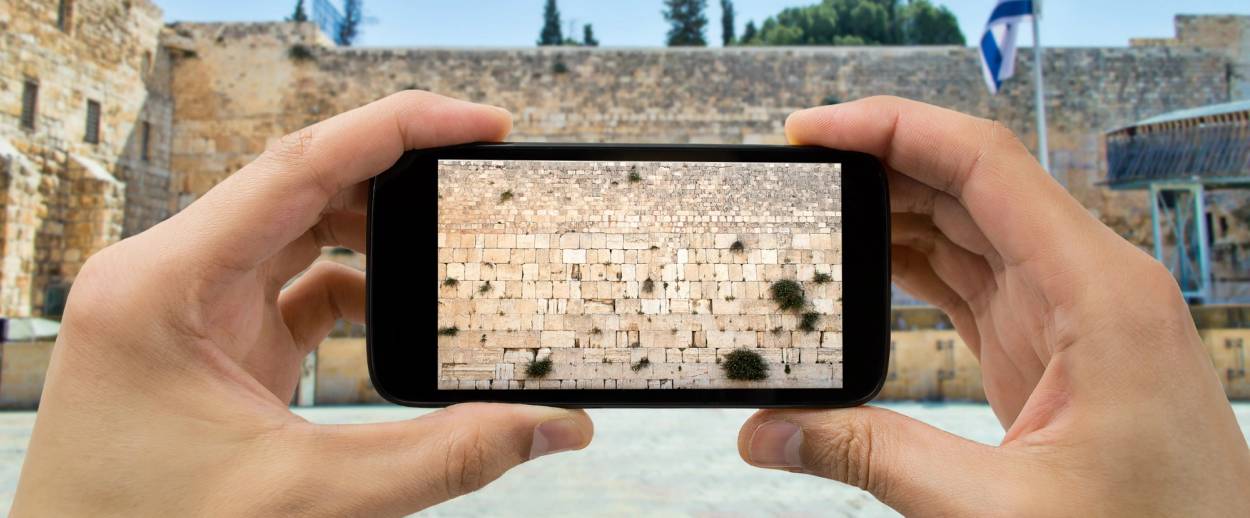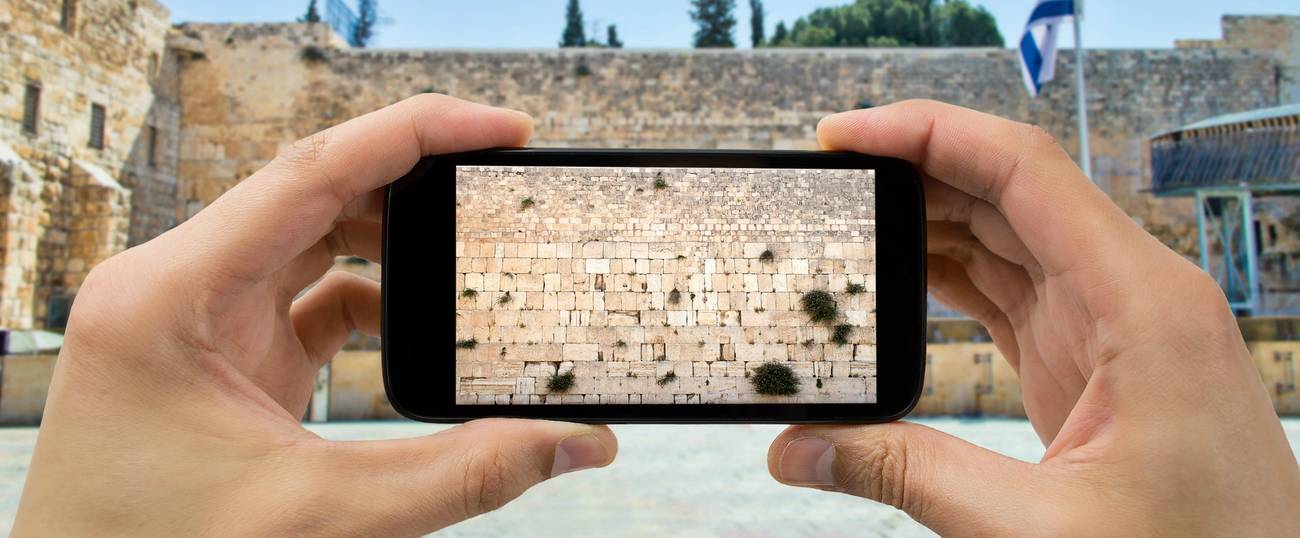The Elul Challenge: To Prepare for the High Holidays, Can You Spend an Hour a Day Without Your Phone?
To repent, you must first know yourself, which means taking a break from technology’s distractions




I was 9 when I first realized I couldn’t pray.
My grandfather, Siegfried, whom I had loved dearly, slipped away suddenly, checking into the hospital one day and disappearing a short spell later. It was summer, and I was at the pool, only dimly aware that he was ill. Death was still a stranger, so when my father showed up suddenly, motioned me out of the water, and broke the news, I felt stunned. I was deemed too young to go to Siegfried’s funeral, but, a month later, I was still dumbstruck when my mother, choking up at her father’s gravesite, asked me to pray to God for his soul.
It struck me as a ridiculous request. If God—in whom, then as now, I wholly and uncomplicatedly believe—took requests from mortals when it came to the souls of their loved ones, did 9-year-olds really rank high in his queue? After all, you needed to be at least 13 before Judaism counted you as a man; wouldn’t the same principle apply to prayer?
I closed my eyes and tried a sincere appeal, but, midway through, I stopped. I was too self-conscious, and, besides, I had other things on my mind, like the crushing weight of the thought that I’ll never again feel Siegfried’s large, warm hands on my back, never again hear his violin, never again feel the presence of this man who had loved me so fiercely and so joyfully. I noted dryly, the way we do when we’re 9, that praying just wasn’t a thing I was good at, and I left it at that.
The same basic belief accompanied me throughout much of adolescence and adulthood, which is why I refrained from trying. At shul, I’d silently mouth the words of the Amidah and then sit down, not inclined to infuse the prayer with any personal intentions. And then I read a book, and as the best ones do, this one, too, changed my life.
It’s called This Is Real and You Are Completely Unprepared, by the late Rabbi Alan Lew. The subtitle neatly captures the book’s essence: The Days of Awe as a Journey of Transformation. Judaism, the book argues—and to the list of apologies I’ll owe at Yom Kippur this year I add this one, to Lew’s memory, for reducing his elegant and thoughtful prose to this clunky summary—does not suggest that the Teshuvah, or repentance, we do around the high holidays has the power to keep terrible things from happening to us. You can be a good, God-fearing man like Siegfried, relatively young and relatively pious, and still die one day in the middle of the summer before you’ve had the chance to say your goodbyes. God works in mysterious ways, over which we have no influence and no hold. But Teshuvah does something even more magical: It will not, as Lew put it, change what happens to us; instead, it will change us. Which is why for one long stretch of time each year, we must get down to the business of repenting.
This is the point of the month of Elul, which begins next week. From the first of the month until the end of Yom Kippur, we’ve 40 days, and, like Moses on the mountaintop, we must use them for intense reflection. These are the days of Teshuvah. How must we pass them? How to repent? This is where things get interesting.
There are many traditions, of course, but most involve praying. No surprise there! But if you’re like me, you must be wondering what that means, and how you’re supposed to repent when you don’t even know how to talk to the Big Guy Upstairs. Again, Lew has some helpful words. The Hebrew word for prayer, he writes, probably came from a Ugaritic verb for judgment, which means that when we pray, we aren’t just making a plea to God—we’re judging ourselves. This being the case, the halting, confused way I had prayed at my grandfather’s graveside all those years ago was actually more on target than I could’ve known: By design, prayer is supposed to happen in cycles. We begin by reciting some words on a page, and then, because we’re human, our minds begin to wander. We catch ourselves and recommit to the Hebrew words in front of us, but a minute or two later we’re thinking of something else again. “The thoughts that carry our attention away are never insignificant thoughts, and they never arise at random,” Lew writes. “We lost our focus precisely because these thoughts need our attention and we refuse to give it to them. This is why they keep sneaking up on our attention and stealing it away. This is how it is that we come to know ourselves as we settle deeply into the act of prayer.” Even if we don’t adhere to traditional prayer books—most of us don’t these days—the same dynamic, intense focus followed by distraction followed by insight into the stirrings of our unconscious, is key. It’s how many ancient forms of meditation work, and the best way, still, to begin and know ourselves, which is instrumental if we are to judge and then repent.
Which leads us to a very big problem: smartphones.
Just ask that wise rabbi, Aziz Ansari. In an interview, the comedian—whose show, Master of None, contains some of the most thoughtful and moving contemplations of religion and its role in public life—admitted that he had deleted all social-media applications, email accounts, and web browsers, from his phone.
“When I first took the browser off my phone,” Ansari told the interviewer, “I’m like, [gasp] How am I gonna look stuff up? But most of the sh-t you look up, it’s not stuff you need to know. All those websites you read while you’re in a cab, you don’t need to look at any of that stuff. It’s better to just sit and be in your own head for a minute. I wanted to stop that thing where I get home and look at websites for an hour-and-a-half, checking to see if there’s a new thing. And read a book instead. I’ve been doing it for a couple months and it’s worked.”
With no distractions, the natural cycle Lew describes, the one at the core of prayer, can take hold. Instead of constantly amusing himself with bits of news and pictures and brief and fleeting messages, Ansari was free to think, and within a short while, he said, his mind felt clear again.
And so, with the holy month of reflection around the bend, here’s an idea. Even if you’re not heading over to shul and cracking open the prayer book, even if you don’t start thinking about making amends until it’s Rosh Hashanah or Yom Kippur, there’s one simple and restorative thing you can do. Call it the Elul Challenge: For one hour every day this month, put away your smartphone. Keep it in a different room, sit somewhere, and read. Or, better yet, leave it at home and go for a walk. Play with your children without the constant trill of new text messages or breaking news or incoming email. Engage fully with yourself and with others, and let the ancient mechanisms of reflection do their bit. A few days in, I hope, you’ll begin to notice just how restorative 60 minutes of uninterrupted being can be. Unable to drown your thoughts in a torrent of technology, you’ll be forced to pay them mind. And when that happens, whether you realize it or not, you’ll be praying.
Thirty days, one hour, no phone. I hope you accept the challenge.
***
Like this article? Sign up for our Daily Digest to get Tablet Magazine’s new content in your inbox each morning.
Liel Leibovitz is editor-at-large for Tablet Magazine and a host of its weekly culture podcast Unorthodox and daily Talmud podcast Take One. He is the editor of Zionism: The Tablet Guide.